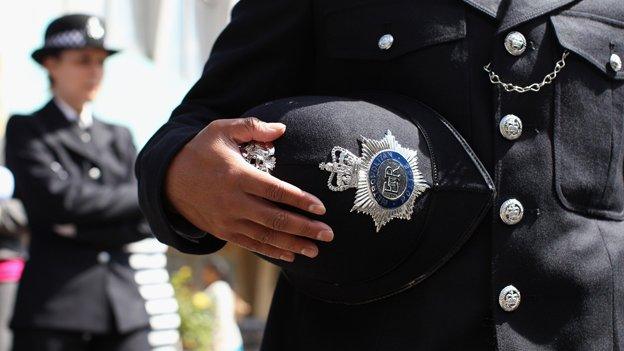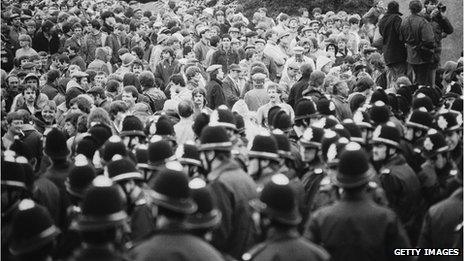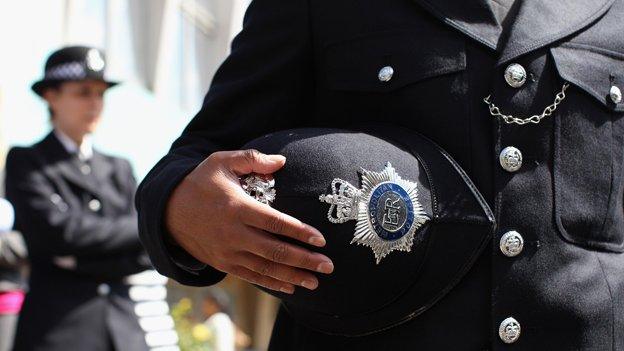Police damaged but not broken, says HMIC report
- Published

Policing in England and Wales has been damaged - but not broken - by scandals, an annual assessment has concluded.
In the first annual report, HM Chief Inspector of Constabulary Tom Winsor said loss of trust was corrosive to the British model of policing by consent.
He said it was the responsibility of chief constables to repair the damage.
He names five events linked to claims of police malpractice, wrongdoing or corruption, including the Stephen Lawrence case and "plebgate" affair.
'Severely shaken'
The five examples he gives are:
The handling of the Stephen Lawrence murder investigation into the killing of a black teenager by a gang of white youths in London in 1993
The Hillsborough disaster and claims that police covered up mistakes during the 1989 FA cup semi-final in which 96 Liverpool fans died
Clashes between police and protesters at Orgreave Colliery during the 1984-85 miners' strike and claims of miscarriages of justice
The so-called plebgate affair which led to the resignation of chief whip Andrew Mitchell after a row with police officers at the gates of Downing Street in 2012
The conduct of some undercover police officers who had relationships with women they were targeting, including some who had children
Tom Winsor: "The police service....[will be] ruthless and uncompromising in finding corrupt police officers and throwing them out"
In his annual report to Parliament, external, Mr Winsor said: "It is very much to be regretted that the confidence of the public in their ability to trust the police has been so severely shaken by controversies which have recently achieved public prominence, and ones which have been the subject of public concern and criticism for many years.
"They include those concerning Hillsborough, Orgreave Colliery, the investigation of the murder of Stephen Lawrence and how police conducted themselves afterwards, the enforced resignation of a cabinet minister as a result of the actions of at least one dishonest police officer, the sexual deception of citizens who trusted undercover police officers, and others."
The report was published on the morning that fresh inquests into the Hillsborough disaster, external were opening in Warrington. Those hearings will look at allegations of police misconduct arising from the aftermath of the tragedy.
Former miners and their families are demanding an inquiry into their claims that they were victims of miscarriages of justice after clashes with police during the 1984-85 miner's strike. The home secretary has separately announced a public inquiry into undercover policing.
The report said that some of the allegations, particularly around the Lawrence case, were so serious that they already justified "severe criticism and public disquiet".
"Loss of trust in the police is corrosive to the heart of the British model of policing by consent by a predominantly unarmed service. Police officers require and depend upon the consent of the community," it said.
Mr Winsor said: "Controversies and revelations of a serious and negative nature in relation to the conduct of some police officers, both past and present, have hurt public confidence in the police, and the morale of the very great majority of honest, hardworking, committed and brave police officers has suffered as a consequence.
"The police service has been damaged, but it is certainly not broken. It is primarily the responsibility of the leadership of the police to repair the damage.

Police and protesters clashed at Orgreave Colliery during the 1984-85 miners' strike
"It is my view and that of the Inspectors of Constabulary that honest, professional police officers are disgusted and distressed at instances of police corruption - for that is what dishonesty is - and are rightly deeply offended and hurt when the media and others attempt to disparage all on the basis of the discreditable actions of few."
The report said that despite budget cuts forces were performing well and most had "credible plans" to balance their books. It added that forces had taken "substantial steps" to protect front line roles.
But the HMIC also criticised police information and communications technology as primitive. In a separate recent report, the inspectorate said that poor computer systems contributed to the failure of forces to tackle domestic violence.
It also warns that police forces may soon face a massive rise in reports of cybercrime. "Reporting of cyber-enabled fraud will rise considerably if and when financial institutions are no longer willing to absorb losses due to fraud without involving the police," said the HMIC.
"If they stop, and the victims of fraud have no reliable means of receiving full financial redress, reporting of this type of crime will increase sharply, and public pressure to tackle offenders - who may be in other countries - will also rise. It is important that the police invests in a timely and efficient manner in the technology and expertise necessary to deal with cybercrime, whether involving fraud or other kinds of offending."
Sir Hugh Orde, president of the Association of Chief Police Officers, said: "HMIC's annual assessment summarises the complex challenges that policing must grapple with: how to find further efficiencies and savings within constrained budgets, how to protect the public against national and international threats across force boundaries and how to optimise consistency in systems and IT across 43 forces."
- Published31 March 2014
- Published2 January 2014

- Published25 March 2014

- Published31 March 2014
